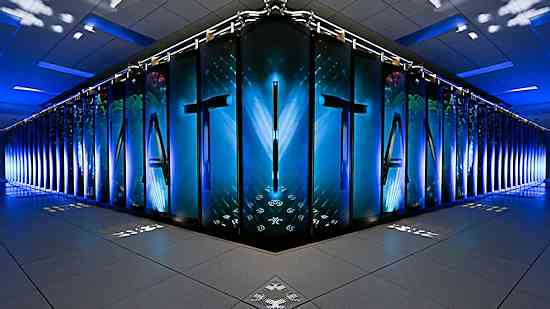''' '' INTEL'S SUPERCOMPUTER
SLIPS '' '''
INTEL SPENT $16 BILLION ON FACTORIES AND EQUIPMENT and $13 billion on research and development in 2019 alone.
FOR DECADES - ''INTEL'' SEEMED AN extremely safe bet to help deliver chip advances, using its production process to develop microprocessors used in the majority of supercomputers today. But foreign competition is now stiff.
GOVERNMENT LABS AND OTHER organizations have long used supercomputers for tasks like breaking foreign communication codes, modelling weather changes and designing drugs.
AURORA was viewed as the lead U.S. entry in the race to build exascale systems, capable of a quintillion calculations a second - roughly a 50-fold increase over existing supercomputers.
INTEL SLIPS - AND A SUPERCOMPUTER IS DELAYED. The project was meant to showcase the independence of American technology.
WHEN it selected Intel to help build a $500 million supercomputer last year, the Energy Department bet that computer chips made in the United States could help counter a technology challenge from China.
Officials at the department's Argonne National Laboratory predicted that the machine called Aurora and scheduled to be installed at facilities near Chicago in 2021, would be the first U.S. system to reach a technical pinnacle known as exascale computing.
Intel pledged to supply three kinds of chips for the system from its factories in Oregon, Arizona and New Mexico.
But a technology delay by the Silicon valley giant has thrown a wrench into that plan, the latest sign of the challenges facing government and industry efforts to reverse America's dependence on foreign-made semiconductor manufacturing technology.
INTEL - WHICH SUPPLIES THE ELECTRONIC BRAINS for most personal computers and web services, has long driven miniaturization advances that make electronic devices smaller, faster and cheaper.
But Robert Swan, its chief executive, warned recently that the next production advance would be 12 months late and suggested that some chips for Arora might be made outside Intel factories.
Intel's problems make it close to impossible that Aurora will be installed on schedule, researchers and analysts said. And shifting key components to foreign factories would undermine company and government hopes of an all American design.
''That is part of the story they were trying to sell,'' said Jack Dongarra, a computer scientist at the University of Tennessee who tracks supercomputer installations around the world. ''Now they stumbled.''
Argoinne and Energy Department officials remain committed to the project and ''are in discussion with Intel to update the delivery plan for Aurora.'' the Argonne lab said in a statement. The partners are ''actively working to mitigate any potential impacts on the schedule,'' Intel said in a separate statement.
The company was already struggling to rebound from a several-year delay in perfecting a new manufacturing process that was finally achieved last year. That lag allowed the technology leadership to pass to Taiwan Semiconductor Manufacturing Company and Samsung Electronics, which build chips designed by other companies.
Intel, the last big U.S., company that both designs and makes microprocessors, signaled this July that it might for the first time use factories owned by other companies to make some cutting-edge chips.
''What's different is we're going to be pretty pragmatic about it and when we should be making stuff inside'' and turn to external factories when it makes the most sense., Mr. Swan told analysts.
Intel's disclosure caused its stock market value to drop by close to $50 billion. They were also bad news for Argonne.
Mr. Dongarra predicted that China would create an exascale machine first, with three expected machines, including one that is scheduled to arrive as early as this year. U.S.'s energy department has funded two other exascale systems scheduled to be installed in 2022, after Aurora.
But manufacturing and operations ''remain the lifeblood'' of Intel. So, many competitors hope that remains true, since Intel's innovations inspire those of other manufacturers.
''There is a lot of pride and politics that goes into these systems - there always has been,'' said Karl Freund, an analyst at Moor Insights & Strategy.
The Honor and Serving of the Latest Global Operational Research on Supercomputers, continues. The World Students Society thanks author Don Clark.
With respectful dedication to the Scientists, Students, Professors and Teachers of the world. See Ya all prepare and register for Great Global Elections on The World Students Society : wssciw.blogspot.com and Twitter - !E-WOW! - The Ecosystem 2011"
''' Crunch - Cramp '''
Good Night and God Bless

.png)


0 comments:
Post a Comment
Grace A Comment!